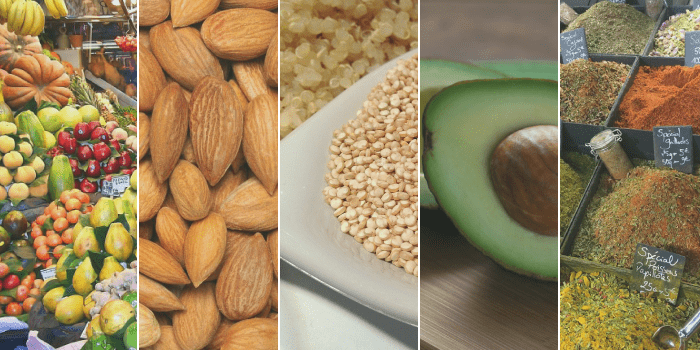Current research advocates for good overall nutrition to help enhance the body’s immune system and provide the necessary antioxidants to reduce the inflammatory stressors.
Inflammation is a natural process in the body that helps protect and repair damaged tissues. However, when inflammation becomes chronic, it can lead to serious health problems. The good news is that there are many strategies you can implement to reduce inflammation and improve your overall health.
Below, Physio Logic’s Clinical Nutritionist, Michelle Miller, MSACN; and Nutritional Educator & Registered Dietitian, Rachel Naar, RD, identify some quick tips and tricks to reduce inflammation.
1. Fruits and Vegetables
Allow these foods to make up at least half of your plate. The key here is variety. The more variety in your plate, the more exposure you have to a myriad of antioxidants. Include leafy greens such as kale or brussels sprouts (Pro tip: Have twice as many servings of vegetables than fruits each day).
2. Plant-Based Protein
Include beans, nuts, and seeds into your diet. These foods are also rich in fiber and can help you to feel fuller longer.
3. Whole Grains
We all know by now that white bread isn’t doing us any favors. Opt for brown, black or wild rice instead of white, include whole oats, buckwheat and quinoa. We also like ancient grains such as millet, farro and amaranth.
4. Healthy Fats
Focus olive oil, avocados, nuts and seeds, and salmon as sources of healthy fats. Not a fan of seafood? Check out our Omega-3 supplement recommendations here.
5. Herbs and Spices
A great way to add some flavor without additional empty calories is to add fresh herbs and spices to your meals. Consider it your 1-2 antioxidant rich punch.
Healthy Lifestyle:
In addition to an anti-inflammatory diet, adopting a healthy lifestyle is crucial for reducing inflammation. Here are some tips:
- Maintain a healthy weight: Excess weight can increase inflammation in the body. Maintaining a healthy weight through balanced eating and regular exercise can help reduce inflammation.
- Engage in regular physical activity: Regular exercise not only helps maintain a healthy weight but also has direct anti-inflammatory effects. Try to incorporate at least 30 minutes of moderate physical activity, such as walking, into your daily routine.
- Stress management: Chronic stress can contribute to inflammation. Find stress management techniques that work for you, such as meditation, deep breathing, or yoga. Dedicate time to activities that relax you and help reduce stress.
- Get adequate rest: Getting enough sleep is crucial for good health and can help reduce inflammation. Try to maintain a regular sleep routine and create an environment conducive to proper rest.
- Avoid excessive alcohol consumption and smoking: Excessive alcohol consumption and cigarette smoking are factors that can increase inflammation in the body. If you smoke, consider seeking help to quit, and if you drink alcohol, do so moderately and responsibly.
Supplements and Natural Remedies:
In addition to dietary and lifestyle changes, there are supplements and natural remedies that can help reduce inflammation. Some of the most researched ones include:
- Omega-3: Omega-3 supplements, such as fish oil, can have significant anti-inflammatory effects. Consult with your doctor before starting any supplements.
- Curcumin: Curcumin is an active compound in turmeric with powerful anti-inflammatory properties. You can find curcumin supplements in capsule form, but make sure to choose a high-quality one.
- Probiotics: Probiotics are beneficial bacteria that can help balance gut flora and reduce inflammation. Incorporate probiotic-rich foods like yogurt and sauerkraut, or consider taking a probiotic supplement.
In summary: Chronic inflammation can have a long-term negative impact on your health. However, through simple changes in your diet, lifestyle, and the use of natural supplements, you can effectively reduce inflammation and improve your overall well-being. Remember that every body is different, so it’s important to consult with a healthcare professional before making significant changes to your diet or starting any supplements. Take advantage of these strategies to reduce inflammation and live a healthier life!
Looking for other ways to supplement an anti-inflammatory diet? If you’d like to create your own personalized nutrition plan, start by filling out the form below.
